The fifth Marx brother: Margaret Dumont
Equilíbrio.
Balance.
Equilíbrio é o que todos nós devemos tentar
alcançar na vida, e também na arte. A vida – e a arte – sem equilíbrio é apenas
exagero, e isso nunca é bom. Quem vive uma vida sem equilíbrio é, mais cedo ou
mais tarde, punido pela justiça ou pelo karma. Arte sem equilíbrio não é boa de
se ver, é rejeitada pelo público, é em
geral classificada como “de mau gosto”.
Balance is what we all
should seek in life, and also in art. Life – and art – without balance is just
exaggeration, and it's never good. Who lives live without balance is, sooner or
later, punished by justice or karma. Art without balance is not nice to look
at, is rejected by the public, is often labeled as “of bad taste”.
Se não há um personagem mais “normal” para criar
equilíbrio em uma dupla, trio ou grupo maluco, a comédia pode perder a graça.
Hardy, o Gordo, era mais esperto e mais realista que Laurel, o magro.
Precisávamos de Dean Martin para neutralizar as loucuras do atrapalhado Jerry
Lewis. E sempre havia alguém mais normal junto com os Três Patetas. Tudo para
criar equilíbrio. Porque o público precisa se identificar com alguém no filme,
e quanto mais normal, melhor.
If there is not a more
“normal” character to create balance in a crazy duo, trio or group, the comedy
may fall flat. Hardy was smarter, and more down-to-earth than Laurel. We needed
straight man Dean Martin to go with the shenanigans of goofy Jerry Lewis. And
there was always someone more normal along the Three Stooges. All to create
balance. Because the public needs an identification with someone onscreen, the
more normal, the better.
E que tal ser o único normal no meio de quatro
malucos? Esta era a difícil tarefa de Margaret Dumont nos sete filmes que ela
fez comos irmãos Marx. Porque ela não era apenas uma ilha de razão em um mar de
loucura, como era Zeppo, ela era também o motivo de muitas, muitas piadas.
And what about being the
only one normal in the middle of four weirdos? This was Margaret Dumont's hard
task in the seven movies she did with the Marx Brothers. Because she wasn't
just an island of reason in a sea of wackiness, like Zeppo was, she was also
the target of many, many jokes.
O nome Daisy Juliette
Baker pode não ser familiar, mas foi assim que Margaret foi batizada ao nascer,
em 1882. Ele era uma soprano, e se apresentou pela primeira vez no vaudeville
pouco antes de completar 20 anos. Sua beleza quando jovem era impressionante, e
ela era em geral escalada para papéis de “soubrette”: moças jovens que
gostavam de flertar em óperas e shows cômicos.
The name Daisy Juliette
Baker may not ring a bell, but it was with this name that Margaret was christened
when she was born, in 1882. She was a trained soprano, and first entered
vaudeville when she was about to turn 20. Her beauty as a young woman was
mesmerizing, and she was often cast in “soubrette” roles: the ones of young
flirtatious girls in comic operas and shows.
Sua primeira investida
como atriz durou até 1910, quando ela se casou com o rico John Moller Jr.
Durante a epidemia de gripe espanhola de 1918, seu marido morreu e a viúva de
38 anos voltou aos palcos.
Her first entertainment
phase lasted until 1910, when she married heir John Moller Jr. During the 1918 influenza pandemic, her husband died and the 36-year-old widow came back to the
stages.
Foi nos palcos que ele
encontrou pela primeira vez os quatro irmãos Marx. Em 1925, ela foi escolhida
para a peça “The Cocoanuts”. Em 1928, ela foi novamente escalada para
contracenar com os irmãos em “Animals Crackers”. Quando os irmãos
receberam uma oferta da Paramount para transportar seus shows para o cinema –
que agora era falado – Margaret os seguiu. Até então, ela havia feito apenas
papéis como extra em dois filmes mudos.
It was on the stage that
she first met the four Marx brothers. In 1925 she was cast in their play The
Cocoanuts. In 1928, she was again cast along them in Animal Crackers. When the
brothers received an offer from Paramount to transport their plays to the – now
talking – movies, Margaret followed them. Until then she had only appeared as
an uncredited extra in two silent films.
Hoje, muitas das
piadas dos irmãos seriam consideradas grosseiras ou politicamente incorretas.
Margaret estreou no cinema com os Marx quando tinha 47 anos, ou seja, não era
uma jovenzinha, e sabemos como o trabalho de atriz pode ser duro para mulheres
mais velhas. Frequentemente ela era insultada, chamada – indiretamente – de
feia, gorda ou velha por Groucho Marx, que era apenas oito anos mais novo que
ela. Pode ser dito que estes insultos faziam parte da graça de Groucho, ou que
não tinha importância porque Margaret não entendia as piadas (o que não é
verdade, pois ela era uma atriz experiente e inteligente).
Today, many of the
brothers' antics would be considered unpolite or politically incorrect.
Margaret entered the movies business with the brothers when she was 47, so she
was no youngster, and we know how hard work is for older actresses. Too often
she was insulted, called – indirectly – ugly or fat or ancient by a Groucho
Marx who was only eight years her junior. It can be said the insults are part
of Groucho's fun, or that Margaret didn’t understand the jokes (which is not
true, since she was an experienced and intelligent performer herself).
É interessante notar
quão forte era a relação de Margaret e Groucho. Ela o chamava carinhosamente de
“Julie” na vida real – o nome de batismo de Groucho é Julius – e Groucho disse
que muitas vezes o público pensava que ele e Margaret eram de fato casados.
Quando ele recebeu um Oscar Honorário em 1974, Margaret foi uma das poucas
pessoas a quem ele agradeceu – os irmãos Gummo e Zeppo, que ainda estavam
vivos, ficaram fora do discurso de agradecimento. E a última aparição de
Margaret na TV aconteceu ao lado de Groucho no programa “The Hollywood
Palace”, oito dias antes de ela morrer.
It's interesting to
notice how strong Margaret's relationship with Groucho was. She fondly called
him “Julie” in real life – Groucho’s real name is Julius – and Groucho said
that the public often thought he and Margaret were, indeed, a couple
off-screen. When he received an Honorary Oscar in 1974, Margaret was one of the
few people he thanked – brothers Gummo and Zeppo, who were still alive, were
left out of the acceptance speech. And Margaret's last appearance on camera
happened alongside Groucho in the TV show The Hollywood Palace, eight days
before her death.
This is my contribution
to the 5th Annual What a Character Blogathon, hosted by mighty trio
Aurora, Kellee and Paula at Citizen Screen, Outspoken & Freckled and Paula’s Cinema Club.
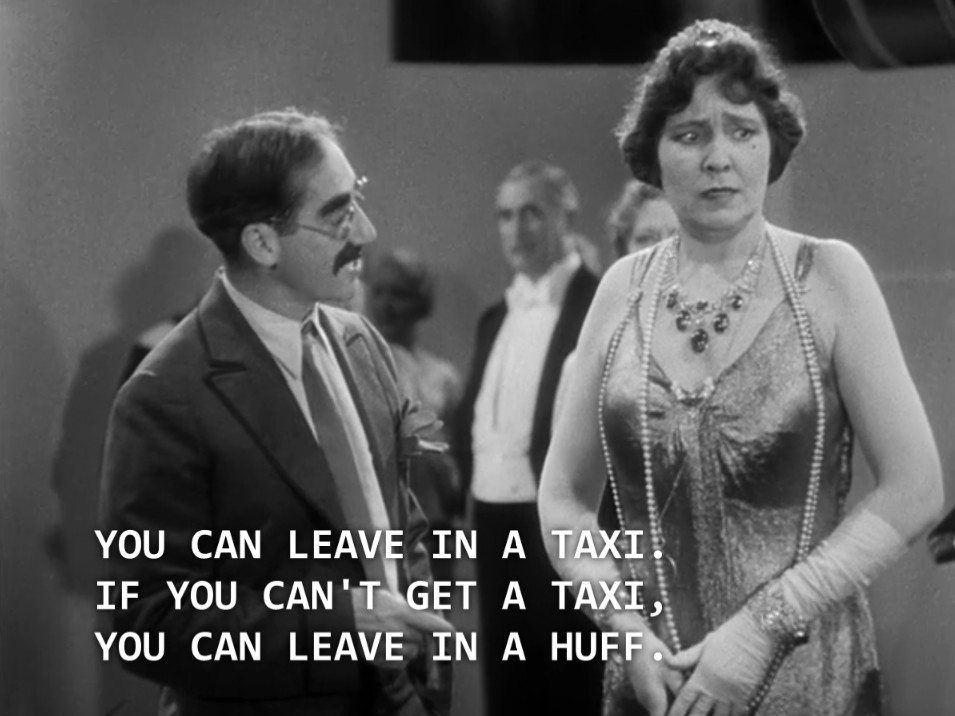
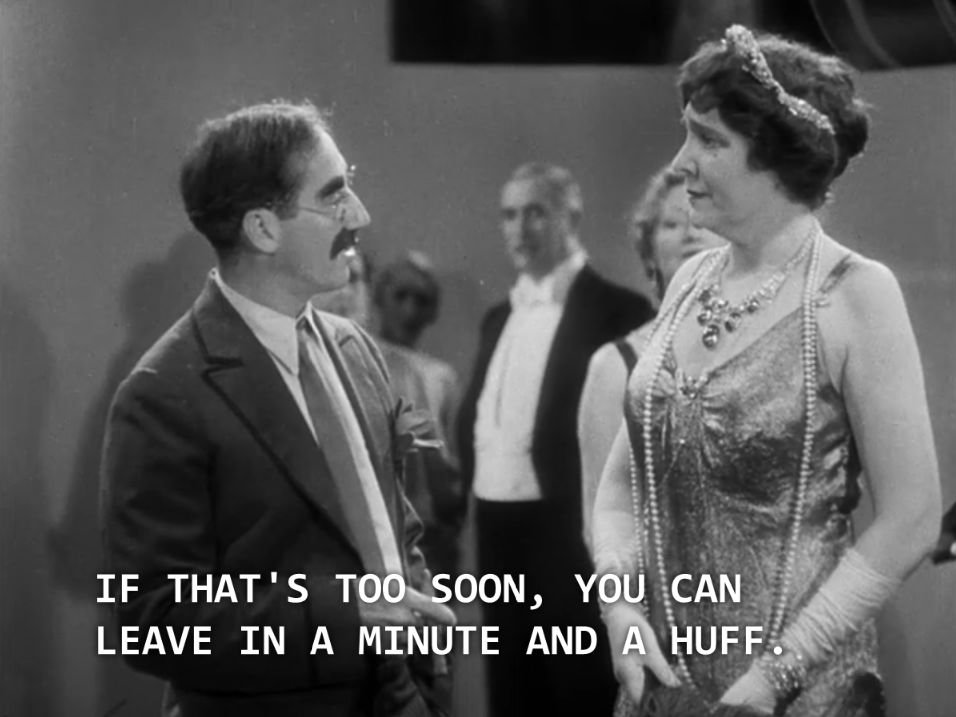

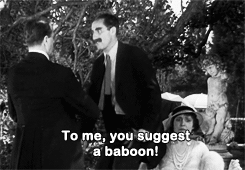
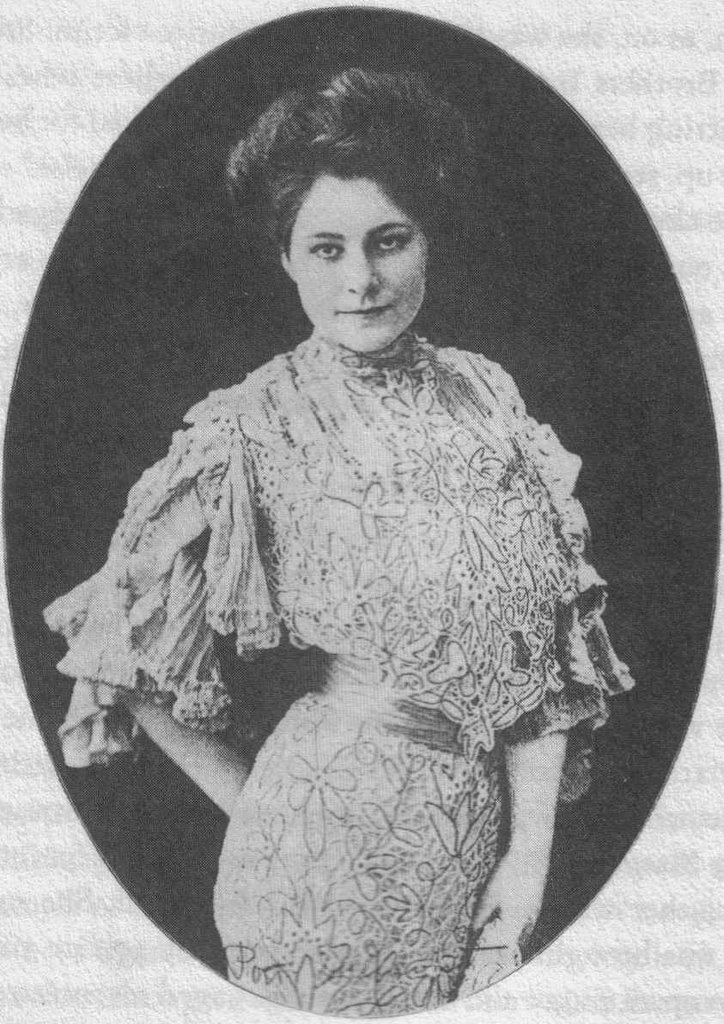
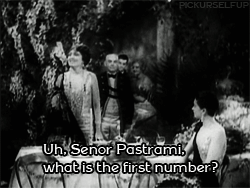
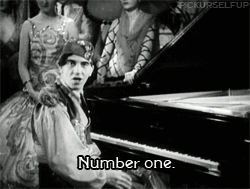
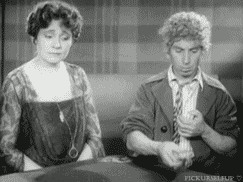
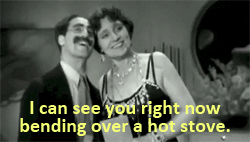
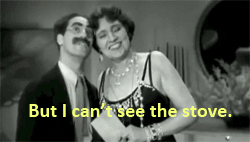
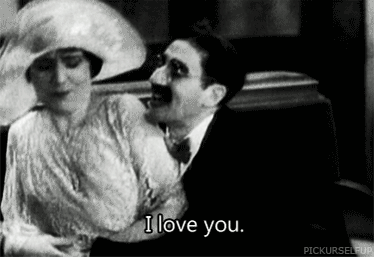

I had read somewhere she never got the jokes, which was why she was such a great straight "man" for them. Guess she did get them, huh?
ReplyDeleteNice find of that younger photo of her.
Margaret had to be one of the best comic actresses to maintain her character's integrity in the face of all that lunacy. I can't watch a Marx Brothers picture without appreciating her role in making the movies classics.
ReplyDeleteI have admit I'm not very familiar with this actress, but nevertheless I really enjoyed your post! From what I read, I believe it was a most interesting choice for the blogathon. And as you said, YES, we need more normal characters among the crazy ones to create a balance! That's what makes me think of what I was saying about Arthur Kennedy in Elmer Gantry.
ReplyDeleteWow, she really was a beauty. It's thanks to her extraordinary comedic talent that most of us (I think) wouldn't see it. I often think Margaret should receive sainthood for what she put up with. Most of it is inappropriate, as you mention, but we really can't do without it.
ReplyDeleteI really enjoyed your tribute and commentary on what this great actress brought to the table. Without her so much of the Marx Bros. fare would be too much to take at times. Terrific read, Le and thank you for submission to the What a Character!
Aurora
Those Marx Brothers movies would not have been the same if they had cast someone else in her roles.
ReplyDelete